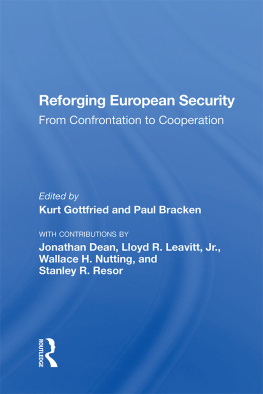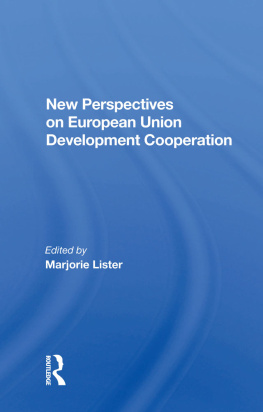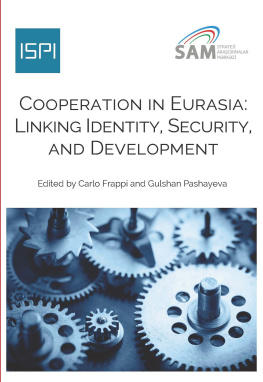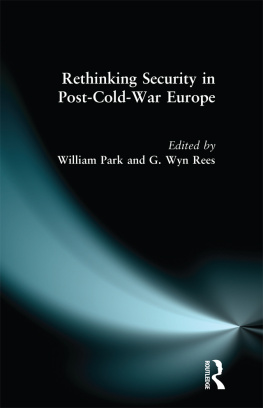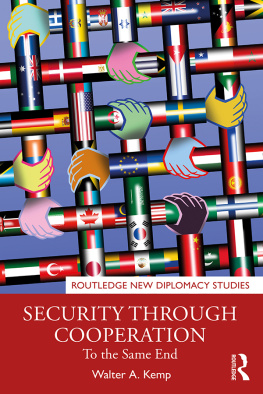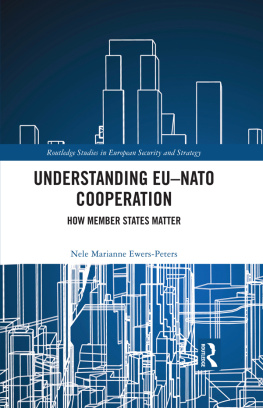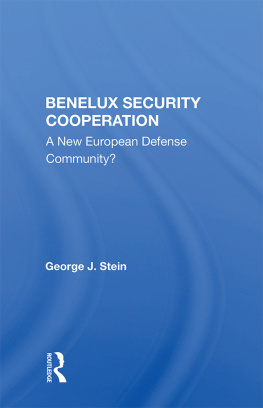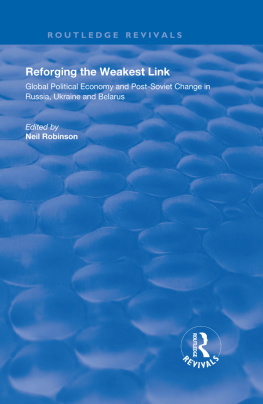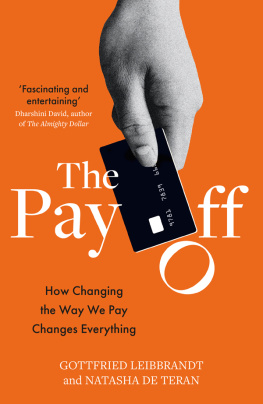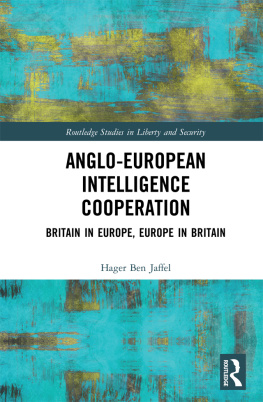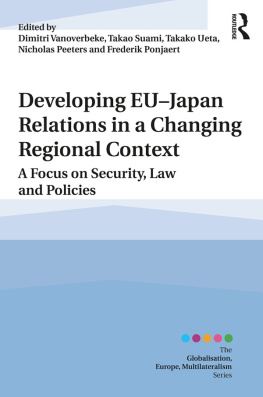First published 1990 by Westview Press, Inc.
Published 2019 by Routledge
52 Vanderbilt Avenue, New York, NY 10017
2 Park Square, Milton Park, Abingdon, Oxon OX14 4RN
Routledge is an imprint of the Taylor & Francis Group, an informa business
Copyright 1990 Taylor & Francis
All rights reserved. No part of this book may be reprinted or reproduced or utilised in any form or by any electronic, mechanical, or other means, now known or hereafter invented, including photocopying and recording, or in any information storage or retrieval system, without permission in writing from the publishers.
Notice:
Product or corporate names may be trademarks or registered trademarks, and are used only for identification and explanation without intent to infringe.
Library of Congress Cataloging-in-Publication Data
Reforging European security: from confrontation to cooperation/
edited by Kurt Gottfried and Paul Bracken; with contributions by Jonathan Dean... [et al.].
p. cm.
Includes index.
ISBN 0-8133-7965-2
1. North Atlantic Treaty Organization. 2. EuropeNational security. 3. United StatesMilitary relationsEurope. 4. Europe Military relationsUnited States. 5. Soviet UnionForeign relations1945 . I. Gottfried, Kurt. II. Bracken, Paul J.
III. Dean, Jonathan.
JX1393.N67R43 1991
355'.03304dc20 90-49905
CIP
ISBN 13: 978-0-367-28536-4 (hbk)
This volume is the result of a three year study of European security affairs. It seeks to provide an integrated picture of the political, economic, arms control and military issues facing the United States, and the Atlantic Alliance as a whole, as they respond to the most profound and promising developments since the signing of the North Atlantic Treaty in 1949.
Our study group was formed in the fall of 1987 when there was, as yet, rather little evidence that the European political environment was at the threshold of a historic transformation. During the winter and spring of 1988 we held a small conference in Washington and conducted an extensive field trip to the major NATO capitals and military headquarters, which enabled us to learn the views of a wide spectrum of Americans and West Europeans with expert knowledge and experience of NATO political and military affairs. Our first complete draft report was finished in December 1988.
At precisely that point East-West relations began to evolve rapidly. The first unexpected development was Mr. Gorbachev's UN speech with its announcement of substantial unilateral cuts. This led to relatively minor revisions, and a complete report was ready for the printer just as Mr. Shevardnadze stepped onto the podium in Vienna and, to our surprise, announced that Moscow agreed with the essence of NATO's position at the Conventional Forces in Europe talks. This meant that Moscow was breaking with traditional Russian (and not just Bolshevik) attitudes towards the military dimension of its security. As a result, extensive revisions were required, and our work was issued in August 1989 in the form of a report by the Cornell University Peace Studies Program entitled Towards a Cooperative Security Regime in Europe , edited by one of the undersigned (KG), and having as its authors the contributors to this volume and Richard L. Garwin, James N. Godwin, George Lewis and John P. Oakley.
What we said in the Foreword our report of one year ago may be of interest to some of our readers:
This report reflects the conditions of the two alliances, and their relationship, as of July 1989. While the alliances may modify their negotiating positions significantly when the Vienna talks reconvene in September, it is more likely that dramatic political developments in Eastern Europe and the Soviet Union will steal the limelight. Nevertheless, it is our belief that these are unlikely to fundamentally alter the thesis on which our findings and policy recommendations rest: that there has been a major long-term shift in political power in favor of the West; that virtually any Soviet government will be obliged to seek a benign international climate; that this logic and economic imperatives will cause Moscow to reduce its military expenditures, either in the context of arms control, or if necessary unilaterally; that the largest risk to Western security stems from the decay of Soviet hegemony in Eastern Europe, for this could spawn dangerous crises; and finally, that it is in the West's interest to capture the unique opportunity created by these circumstances, and the bold policies of President Gorbachev, to fashion a new cooperative security regime that will, for the first time since NATO's formation, embed a stable and balanced military setting in a framework of contractual commitments that would greatly help sustain Alliance solidarity and simultaneously provide incentives for long-term Soviet adherence to the new modus vivendi.
We make no claim to clairvoyance because one year ago we wrote that "dramatic political developments in Eastern Europe and the Soviet Union will steal the limelight" because we certainly did not foresee that the deep flaws then clearly visible in the massive 44-year-old Soviet bloc would erupt into so sudden and total a collapse in just a few months. We may point out, however, that our "thesis" as stated in the quotation remains largely valid despite the revolution of 1989.
A sweeping revision of our report was, nevertheless, mandatory once all the communist regimes in Central and Eastern Europe had fallen, and German unificationwhich with everyone we thought was still far awayhad become an imminent prospect. This book is the result of this work. It draws, often heavily, on our report of 1989, but it goes well beyond it because it pays much more attention to problems that now are, or at least should be, of pressing concern but which would not have interested many pragmatic people one year ago. Hence recurring themes in this book are issues that are for once truly strategic, in that they require an integrated reassessment of fundamental interests and the means available for pursuing them, and, furthermore, a view of long term objectives that is both better focused and more imaginative than was necessary when the Cold War held the international system in its grip.
In conducting our study and preparing this book we have benefited from the experience, knowledge, advice, effort, help and support of many people. We wish, above all, to acknowledge the important contributions of Richard L. Garwin, James N. Godwin, George Lewis and John P. Oakley, who were our coauthors of our 1989 report, and Henry W. Kendall, who for almost a year was an active study participant. Our visits to London, Bonn and Paris were made especially valuable through the invaluable cooperation of Donald Bandler, Lawrence Friedman, and Lutz Unterseher, all of whom also gave us the benefit of their expertise. We wish to extend our gratitude for conversations with and written communication from Christopher Donnelly, William Ehrman, Francois Heisbourg, John Keegan, David Nicholls, and Peter Vigor in London; John Galvin, Alton Keel, William L. Kirk, John C. Komblum, and Glenn K. Otis at NATO headquarters; Richard Burt, Leopold Chalupa, Olaf Grobel, Rolf Hofstetter, Karl Kaiser, Volker Ruhe, and Karsten Voigt in Bonn; and in Paris, Henri Conze, Benoit d'Aboville, Jean d'Amecourt, Jean Klein, Pierre Lellouche, and Andrew J. Pierre. We would also like to thank Stephen Biddle, Bruce G. Blair, George L. Butler, Stephen Canby, Edward Corcoran, Gary Crocker, Paul K. Davis, Lou Finch, Charles A. Gabriel, Lynn Hanson, Jim Hinds, Peter J. Katzenstein, John Keliher, E.G. Meyer, Yuri F. Orlov, Thomas Risse-Kappen, Peter Sharfman, Marshall Shulman, Stanley Sloan, and Edward L. Warner.


